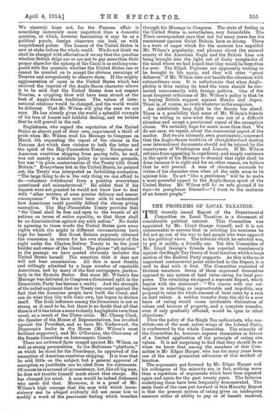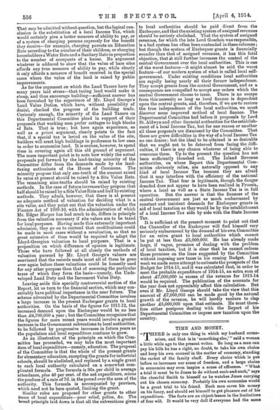THE PROBLEMS OF LOCAL TAXATION.
rrHE recently issued Report of the Departmental _L Committee on Local Taxation is a document of considerable political interest. This Committee was appointed by Mr. Lloyd George himself, and it is not unreasonable to assume that in selecting his nominees he did not go out of his way to find people who were opposed to his political views. The tribunal which he selected was, to put it mildly, a friendly one. Yet this Committee of Mr. Lloyd George's friends has reported unanimously against the Single Tax theory of local taxation which a large section of the Radical Party supports. As this is the most important controversial point embodied in the Report, it is well to deal with it first. The Committee consisted of thirteen members. Seven of these expressed themselves opposed to any system of land value rating for local pur- poses. The remaining six signed a separate Report, which begins with the statement : " We concur with our col- leagues in rejecting, as impracticable and impolitic, any proposal to raise the whole amount of local rates by a rate on land values. A sudden transfer from the old to a new basis of rating would cause intolerable dislocation of values and tenures of property, and a complete transfer, even if only gradually effected, would be open to other objections."
Thus the policy of the Single Tax enthusiasts, who con- stitute one of the most active wings of the Liberal Party, is condemned by the whole Committee. The minority of the Committee do, however, express themselves in favour of a limited application of the principle of rating site values. It is not surprising to find that they should do so when we know that among the members of this Com- mittee is Mr Edgar Harper, who has for many years been one of the most prominent advocates of this method of taxation.
The arguments put forward by Mr. Edgar Harper and his colleagues of the minority are, in fact, nothing more than a repetition of arguments which have been repeated again and again for the past twenty years. The fallacies underlying them have been frequently demonstrated. The main basis of the case put forward in this Minority Report is that the present system of rating gives an inadequate measure either of ability to pay or of benefit received.. That may be admitted without question, but thelogical con- clusion is the substitution of a local Income Tax, which would certainly give a better measure of ability to pay, or of a system of charging persons expressly for the benefit they receive—for example, charging parents an Education Rate according to the number of their children, or charging Lou Beholders aWater Rate and a Sanitary Rate in proportion to the number of occupants of a house. No argument whatever is adduced to show that the value of bare sites affords any true measure of ability to pay, while clearly it only affords a measure of benefit received in the special cases where the value of the land is raised by public improvements. As for the argument on which the Land Taxers have for many years laid stress—that taxing land would make it cheap, and thus encourage building—sufficient answer has been furnished by the experience of Mr. Lloyd George's Land Value Duties, which have, without possibility of denial, checked the progress of the building trade. Curiously enough, the minority of the Land Taxers on this Departmental Committee plead in support of their proposals that working men prefer cottages to high blocks of fiats. That is true ; but here again experience, as well as a priori argument, clearly points to the fact that, if a special tax is levied on the value of the site, builders will erect high buildings in preference to low ones in order to economize land. It is useless, however, to spend time in covering again all this old ground of argument. The more important point is to note how widely the actual proposals put forward by the land-taxing minority of the Committee differ from the demands made by the land- taxing enthusiasts of the House of Commons. The minority propose that only one-tenth of the amount raised by rates at present should be raised by a Site Value Rate. The remaining nine-tenths should be raised by existing methods. In the case of future increases they propose that half should be raised by a Site Value Rate and half by existing methods. They admit, however, that there is at present no adequate method of valuation for deciding what is a site value, and they point out that the valuation tinder the Finance Act of 1909-10, with the administration of which Mr. Edgar Harper has had much to do, differs in principle from the valuation necessary if site values are to be taxed for local purposes. Having made this extremely important admission, they go on to contend that modifications could be made in most cases without a revaluation, so that no great extension of time would be required to adapt the Lloyd-Georgian valuation to local purposes. That is a proposition on which difference of opinion is legitimate. Those who have followed at all closely the methods of valuation pursued by Mr. Lloyd George's valuers are convinced that the records made must all of them be gone over again before these valuations could be honestly used for any other purpose than that of assessing the particular taxes of which they form the basis—namely, the Unde- veloped Land Duty and the Increment Value Duty.
Leaving aside this specially controversial section of the Report, let us turn to the financial section, which may con- ceivably have political importance in the near future. The scheme advocated by the Departmental Committee involves a large increase in the present Exchequer grants to local authorities. On the basis of the figures for 1911-12, the increased demand upon the Exchequer would be no less than £4,700,000 a year ; but the Committee recognizes that the figures for more recent years would involve a greater increase in the Government subventions to local authorities, to be followed by progressive increases in future years as the population and local expenditure continue to grow.
As an illustration of the principle on which the Com- mittee has proceeded, we may take the most important item of local expenditure—namely, education. The proposal of the Committee is that the whole of the present grants for elementary education, excepting the grants for industrial schools, should be abolished, and replaced by a single grant to each local authority calculated on a somewhat com- plicated formula. The formula is 36s. per child in average attendance, plus 40 per cent. of the net expenditure, minus the produce of a rate of 7d. in the pound over the area of the authority. This formula is accompanied by provisos, which need not be here quoted, limiting the grant. Similar rules are proposed for other grants to other items of local expenditure—poor relief, police, &c. The broad principle laid down is that all the subventions given to local authorities should be paid direct from the Exchequer, and that the existing system of assigned revenues should be entirely abolished. That the system of assigned revenues, for which the late Lord Goschen was responsible, is a bad system has often been contended in these columns ; but though the system of Exchequer grants is financially sounder than that of assigned revenues, it has this fatal objection, that A still further increases the control of the central Government over the local authorities. This is one of the worst features—it might almost be said the worst feature—of our modern system of what is called local self- government. Under existing conditions local authorities are rapidly losing nearly all their former independence. They accept grants from the central Government, and as a consequence are compelled to accept any orders which the central Government choose to issue. There is no escape from this necessity so long as local finance is dependent upon the central grants, and, therefore, if we are to restore the true independence of the local authorities, we must discover some improved method of local finance. The Departmental Committee had before it proposals by Lord St. Aldwyn and other financial authorities for the establish- ment of a local Income Tax, but for one reason or another all these proposals are dismissed by the Committee. That there are grave difficulties in the way of a local Income Tax no one denies ; but the ideal to be attained is so desirable that we ought not to be deterred from facing the diffi- culties, if there is any chance whatever of being able to overcome them. Up to the present the question has not been sufficiently thrashed out. The Inland Revenue authorities, on whose Report this Departmental Com- mittee obviously relies, are naturally opposed to any kind of local Income Tax because they are afraid that it may interfere with the efficiency of the national Income Tax. That fear is legitimate, though the danger dreaded does not appear to have been realized in Prussia, where a local as well as a State Income Tax is in full operation. But the answer is that the finances of the central Government are just as much embarrassed by constant and insistent demands for Exchequer grants in aid of local taxation as they would be by the establishment of a local Income Tax side by side with the State Income Tax.
It is sufficient at the present moment to point out that the Chancellor of the Exchequer will find himself very seriously embarrassed by the demand of his own Committee for an extra grant to local authorities which cannot be put at less than £5,000,000. He has already made large, if vague, promises of dealing with the problem of local taxation, but it is clear that he cannot redeem these promises on the lines suggested by the Committee without imposing new taxes in his coming Budget. Last week we made some attempt to estimate the prospects of the Budget for 1914.15, and it was calculated that, in order to meet the probable expenditure of 1914-15, an extra sum of about £7,000,000 in excess of the revenue for 1913-14 would be required. The publication of the accounts for the year does not appreciably affect this calculation. But even if Mr. Lloyd George should take the view that this amount of £7,000,000 can be made good by the natural growth of the revenue, he will hardly venture to clap another £5,000,000 upon that estimate. He must there. fore either postpone dealing with the Report of his Departmental Committee or impose new taxation upon the country.















































 Previous page
Previous page